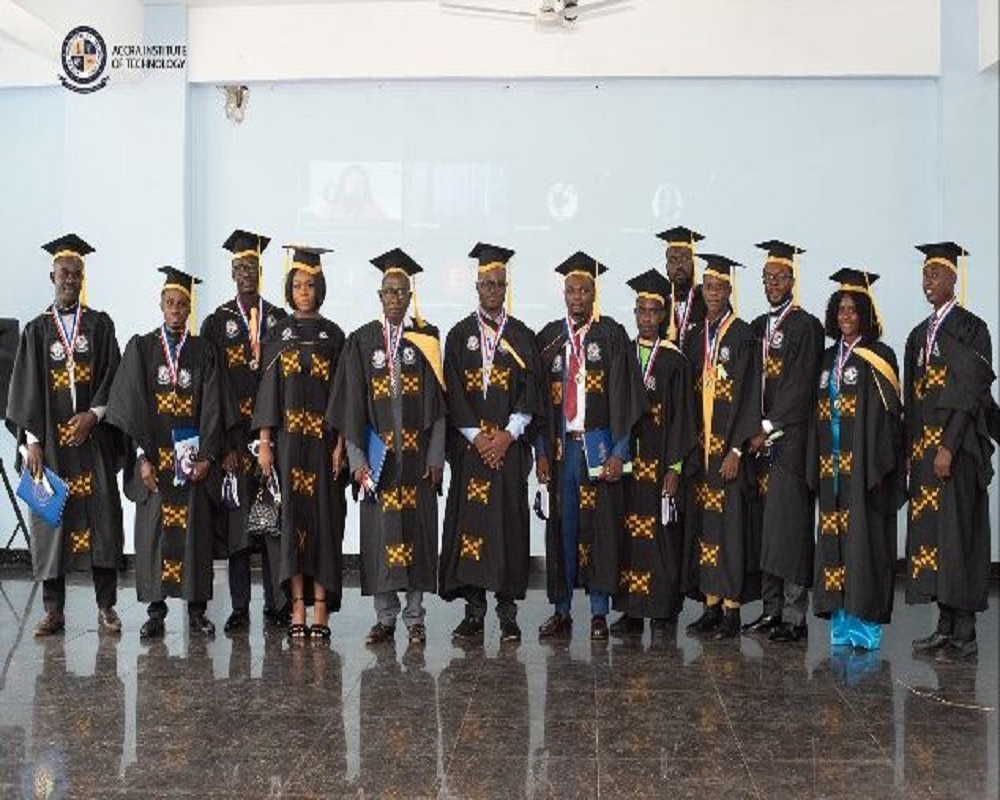Broadcasting
Accra Institute of Technology Graduates 8th Batch of PhDs

The Accra Institute of Technology (AIT), a leading technology-focused private university has further helped to increase Africa’s rising number of scholars in technology related fields as the university graduated its eighth batch of PhDs during its recently held 16th Graduation Ceremony at the University’s Knowledge City Campus (KCC), Kokomlemle, Accra.

Group photographs from Accra Institute of Technology (AIT) graduation of eighth batch of PhD candidates.
This brings the total number of PhDs graduated at AIT since 2016 to Forty-Nine (49) in the fields of Engineering, Business Administration, Education, and Information Technology.
According to a statement released by the university, “This achievement marks not only an AIT history but also a history in the annals of private university education in this country.
This event also saw the graduation of 219 Bachelor’s and 33 Master’s degree holders from both the campus-based undergraduate programs as well as to the Open University undergraduate and postgraduate programs. It was also witnessed with the deployment of current technology that facilitated the organization of a virtual graduation experience specifically for majority of the students using the Google Meet platform.”
Founded to close the technology research and manpower gaps across the African continent, AIT is ranked at the top as a private university in Ghana by the Ghana Tertiary Awards and still holds since 2018, the coveted Best in Technology-Focused University – Ghana Award by Global Business Insight of the United Kingdom.
“All indicators point to the fact that AIT as a university with its high-powered and academically distinguished Board of Trustees are meeting several envisaged milestones as a young and growing dynamic institution which is showing all the encouraging signs of becoming a world-class university,” said the Chairman of the AIT Board of Trustees, Professor Edward Ayensu, in his address to the congregation.
Prof Ayensu assured the congregation, and all stakeholders, that AIT shall not relent in its efforts to “ensure the full fulfillment of the vision to deliver quality university education and facilitate cutting-edge research work for the benefit of our students.”
A pan-African university, AIT is a technology-focused university committed to academic excellence and cutting-edge scientific and industrial research and R&D work.
The university has for the 4th year running won the 2-18 Best Technology University in Ghana Award, instituted and awarded by the Ghana Tertiary Awards.
Also, while addressing the congregation, President of AIT, Professor Clement Dzidonu, outlined great strides by the university over the past year in improving its academic program offerings as well as its enrollments.
He added that AIT is currently doing Ph.D. research work in Engineering, Information Technology, Education, and Business Administration with an enrollment of a number of the academic and senior administrative staff from almost all the public and private universities in Ghana.
He underscored how achieving such a feat within the span of ten years is nothing short of an academic marvel given the fact that AIT has successfully offered, run, and graduated students on an internationally benchmarked Doctor of Philosophy (Ph.D.) degree program within a context where the Ph.D. per capita of Ghana is extremely low.
AIT remains committed to addressing the African knowledge and technology gaps, said Dzidonu held in high regard as one of the continent’s leading scholars in technology and its applications to social development.
Dzidonu encouraged the graduating class to avail themselves and make the best of all opportunities that may come their way after graduation.
He assured those planning to pursue graduate studies at either the Master’s or the Ph.D. level of an enriched academic life and experience at AIT, should they choose to enroll with their Alma Mater.
AIT is accredited by the National Accreditation Board (NAB), to offer both campus-based and Open University undergraduate and postgraduate programs.
AIT is affiliated to the Kwame Nkrumah University of Science and Technology (KNUST) for the campus-based undergraduate programs in engineering, computer science/IT, and business administration and the Open University of Malaysia for the Open University undergraduate and postgraduate programs at the Masters and the Ph.D. level.
Broadcasting
Subscriber Withdraws Suit against MultiChoice, FCCPC over Price Hike

Festus Sanmi Onifade, subscriber and legal practitioner, has withdrawn his lawsuit challenging alleged unfair price hikes by MultiChoice Nigeria Limited, filed at the Federal High Court in Abuja.

Also listed as a defendant in the suit is the Federal Competition and Consumer Protection Commission (FCCPC).
In a notice of discontinuance, dated April 1, 2025, the claimant formally informed the court of his decision to wholly withdraw the suit, marked FHC/ABJ/CS/363/2025.
However, the notice, signed by Onifade, did not advance reasons for the withdrawal.
Onifade had earlier approached the court to challenge what he described as an unfair and unjust price increase announced by MultiChoice Nigeria, slated to take effect from March 15, 2025.
In the originating summons, he asked the court to determine, among other things, whether, given Section 128 of the Federal Competition and Consumer Protection Act, 2018, and other relevant laws, the notice of the impending price increase issued by the first defendant was not unfair, unjust, grossly inadequate and a breach of his consumer rights; whether, considering the subsisting appeal in MultiChoice Nigeria Ltd & Ors v. Festus Onifade & Ors, the defendant was not stopped from further increasing the price of its services.
The suit centred on legal tussle between Onifade and MultiChoice over price hikes, which the claimant insisted were being implemented in defiance of regulatory standards and without adequate consumer engagement.
Broadcasting
Starlink, DStv, Others Pay “Peanuts” to Operate in Nigeria- Minister

Uche Nnaji, minister of Innovation, Science and Technology, has, said that the federal government has been exploring measures to curb the growing exploitation of satellite technologies, lamenting that Starlink, DStv, and a few other service providers pay ‘peanuts’ to operate in Nigeria.

According to him, some foreign investors have been known to find a way to bypass the system and deprive the government of its mandatory revenues.
The minister made the revelation at a stakeholders’ Workshop on Space Regulation organised by the National Space Research and Development Agency (NASRDA) in Abuja.
Addressing the gathering, Nnaji noted that if the regulation of space is properly handled, it would not only boost revenue, it will also whittle down the growing activities of pipeline vandals, insurgents and criminal groups.
He said, “In the near future, we will move from the $ 1 trillion economy to $ 5 trillion. So with this space regulation and licensing. Starlink and most of them, including DSTV will come here, some will pay peanuts and shortchange Nigerians. These are part of what we want to address through this space regulation and license.
“You can be sure that yearly, if we are going by what my capacity DG of NASRDA has said, we will be looking at over N200 billion annually, with annual increment of 18-20 per cent. This is just one of the initiatives coming out of the agency.”
Continuing, Nnaji said the era of satellite pay-tv or radio losing signal when it is raining will soon be a thing of the past.
The minister said they have discovered some service providers are not operating on the right bandwidths hence the loss of signal when there is a change in weather.
“All these challenges of your TV or radio not working or losing signal whenever it is raining are because the DSTV and the likes are not hosting their equipment at the right bandwidth. They will host it at the lower bandwidth, where they will not spend money on the higher bandwidth.
“But with the regulation, we will force them to move it up to where it’s supposed to be. Because if you move it up to where it’s supposed to be, you won’t have any of those problems of losing signal as soon as it starts raining. So this is part of the many reforms that are going on under this very capable man, Dr. Olumide Adepoju.
Broadcasting
Nigeria Eyes $20Bn Annual Revenue from Space Economy – Minister

Federal government has announced its target of generating over $20bn annually from Nigeria’s rapidly evolving space economy, leveraging a newly launched space security platform and comprehensive regulatory reforms.

Speaking at the launch event in Abuja on Tuesday, Chief Uche Geoffrey Nnaji, minister of Innovation, Science and Technology, unveiled the government’s strategic plans to capitalize on space technologies for national revenue generation, particularly in key sectors like oil monitoring and maritime surveillance.
“With space-based surveillance, we can detect vessels entering Nigerian waters—even those that switch off their transponders to evade detection. We’ll be able to track them, ensure compliance, and collect the appropriate fees. This initiative alone could yield over $20 billion annually,” he said.
The Minister emphasised that Nigeria’s space economy is no longer a futuristic dream but a present-day economic lever.
“Space is no longer the domain of dreamers alone—it is now the frontier of serious business, innovation, and national security,” he declared.
“Our task is clear: to establish a transparent, well-regulated ecosystem where public and private actors—from startups to established institutions—can thrive,” he added.
The new space security platform is tied to the enforcement of Nigeria’s 2015 Regulations on the Licensing and Supervision of Space Activities.
Section 4(1), mandates that no one “shall carry out activities to which the Regulations apply except under the authority of a license granted by the National Space Council.”
These regulations aim to hold local and foreign operators—such as Starlink and DSTV—accountable under Nigerian law.
“Currently, some pay appropriate fees, while others contribute minimally, shortchanging Nigerians. This new regulatory framework will address that imbalance,” Nnaji stated.
Dr. Matthew Adepoju, director general, National Space Research and Development Agency (NASRDA), echoed the Minister’s sentiments, highlighting the economic, security, and youth empowerment potential of the sector.
“Nigeria must remain a forward-thinking nation. We must ensure that space activities within our jurisdiction are properly regulated, commercially optimized, and aligned with international best practices,” Adepoju said.
According to NASRDA, Nigeria can generate about N200bn annually from space-related activities, with potential growth rates of 18–20 per cent per year.
The workshop, which gathered key stakeholders from government, academia, and the private sector, marks a pivotal shift in Nigeria’s approach to space as a tool for development.
It also underscores the urgency to reform existing legal frameworks.
Dr. Olisa Agbakoba, legal expert, who also spoke at the event, criticized Nigeria’s outdated space laws.
“Our current laws are outdated. The NASRDA Act is not a true space law. We need a clear economic strategy for space, legal reform, and an updated National Space Policy,” he said.
Agbakoba proposed creating a Center for Space Law and emphasized that space should contribute at least 2% to Nigeria’s GDP.
“Let’s learn from countries like the UAE. Why not aim for Nigerian astronauts—male and female?” he asked.
Mrs. Esuabana Asanye, permanent secretary of the Ministry, while unveiling the new NASRDA logo, positioned the current phase as a new era in Nigeria’s space journey: “We are now turning the page from the first 25 years, and ushering in a new era—one that will redefine Nigeria’s presence in space.”

 Telecom3 days ago
Telecom3 days agoMTN Plans Second Public Offer in Nigeria

 Broadcasting3 days ago
Broadcasting3 days agoSubscriber Withdraws Suit against MultiChoice, FCCPC over Price Hike

 E-Business3 days ago
E-Business3 days agoCyberattacks: ‘56 Percent of Cases Stem from Existing Logins

 News3 days ago
News3 days agoSenate Committee Partners with Kuda Bank to Tackle Compliance Crisis as Nigeria Loses ₦3.4 Trillion

 E-Business3 days ago
E-Business3 days agoKaspersky Presents Insight on 14% Increase in Spyware Attacks on Businesses in Africa @ GITEX Africa

 E-Financial3 days ago
E-Financial3 days agoSterling Bank Reiterates Transfer Fees Removal

 General News3 days ago
General News3 days agoOpenAI Sues Elon Musk Claiming Bad-Faith Tactics

 General News3 days ago
General News3 days agoFG Unveils e-Visa, Digital Entry Cards to Strengthen Border Security


























